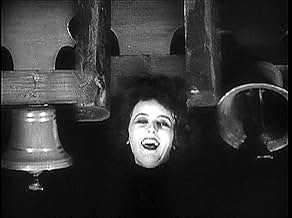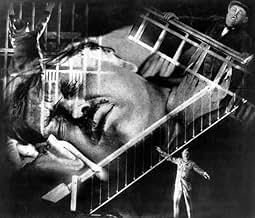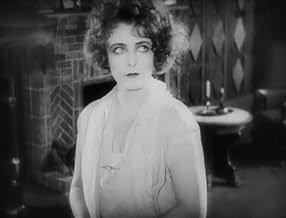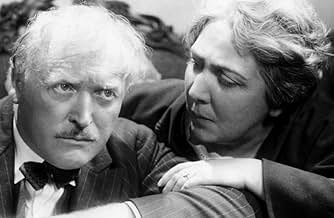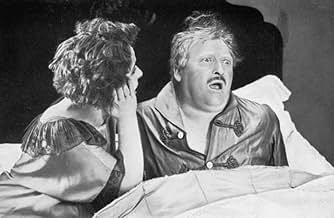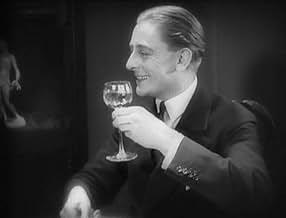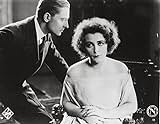AVALIAÇÃO DA IMDb
6,8/10
863
SUA AVALIAÇÃO
Adicionar um enredo no seu idiomaA scientist is tormented by an irrational fear of knives and the irresistible compulsion to murder his wife.A scientist is tormented by an irrational fear of knives and the irresistible compulsion to murder his wife.A scientist is tormented by an irrational fear of knives and the irresistible compulsion to murder his wife.
- Direção
- Roteiristas
- Artistas
Avaliações em destaque
I come to this as someone who thinks the presentation of dreams - much more than dreams themselves - imitates the ways we use to structure the self that presents the world to us. Charting the cinematic effort of that is exciting to me.
And well, this is an interesting film to say the least, and from an interesting time. The backstory is that Freud himself approved of it and moreover sent two from his trusted Viennese circle to aid and supervise the UFA production on what would be a rational explication of psychoanalysis. You should know that his were radical , modern ideas in their time and for twenty years had been a sensation. And the Weimar public at large was struggling with deep-seated nightmares of their own, evidenced in Caligari and elsewhere, so it was very receptive to the new science for sleep, and probably every bit as confused about it as the somnambulist in Caligari.
But oh boy, haven't our narrative devices come far since Freud.
In the film, we have suddenly strange , unsettling urges followed by a puzzling nightmare, and then a psychoanalyst sits us down to kindly explain and assuage irrational fear.
Nevermind the obtuse focus on sex and symbolic interpretation of dreams, that was Freud. The emphasis on phallic imagery, the incidental aversion to knives linked to imaginary castration in the patient. Jung would make the transition to a character-based dreamworld, and we are growing out of that too. We are insanely more complicated beings these days than a logic like Freud's can explain, our dreams much more layered, and you can see that in contemporary filmmakers who are dabbling with dream.
We are unsure these days where day begins, that much (night) was certain then. Our dreams also come from movies and TV, from tweets and instagram, and we're beginning to understand what the Buddhist had been saying all along; the mind's function is to project snippets of narrative around a fictional self, and the most loaded dream is no different in mechanism to the most trivial thought. You are always at the center of an illusionary world you have set in motion, but you won't know that without a center in emptiness.
The trigger for it is something to consider though. A murder (by knife) has taken place the day before in the same street, a wife killed by the husband. The same urge somehow surfaces in our guy.
The actual nightmare has dated, along with the logic behind it and German expressionism. It is this eerie confluence of semiconscious machinery that still carries power. It is this aspect of dreaming Pabst would cultivate in later works.
And well, this is an interesting film to say the least, and from an interesting time. The backstory is that Freud himself approved of it and moreover sent two from his trusted Viennese circle to aid and supervise the UFA production on what would be a rational explication of psychoanalysis. You should know that his were radical , modern ideas in their time and for twenty years had been a sensation. And the Weimar public at large was struggling with deep-seated nightmares of their own, evidenced in Caligari and elsewhere, so it was very receptive to the new science for sleep, and probably every bit as confused about it as the somnambulist in Caligari.
But oh boy, haven't our narrative devices come far since Freud.
In the film, we have suddenly strange , unsettling urges followed by a puzzling nightmare, and then a psychoanalyst sits us down to kindly explain and assuage irrational fear.
Nevermind the obtuse focus on sex and symbolic interpretation of dreams, that was Freud. The emphasis on phallic imagery, the incidental aversion to knives linked to imaginary castration in the patient. Jung would make the transition to a character-based dreamworld, and we are growing out of that too. We are insanely more complicated beings these days than a logic like Freud's can explain, our dreams much more layered, and you can see that in contemporary filmmakers who are dabbling with dream.
We are unsure these days where day begins, that much (night) was certain then. Our dreams also come from movies and TV, from tweets and instagram, and we're beginning to understand what the Buddhist had been saying all along; the mind's function is to project snippets of narrative around a fictional self, and the most loaded dream is no different in mechanism to the most trivial thought. You are always at the center of an illusionary world you have set in motion, but you won't know that without a center in emptiness.
The trigger for it is something to consider though. A murder (by knife) has taken place the day before in the same street, a wife killed by the husband. The same urge somehow surfaces in our guy.
The actual nightmare has dated, along with the logic behind it and German expressionism. It is this eerie confluence of semiconscious machinery that still carries power. It is this aspect of dreaming Pabst would cultivate in later works.
There are a lot of important elements the restorers chose to omit from the movie. There are letters that are opened & are supposed to appear on screen for the audience to read. Gone. A man pulls up on a bike delivering a telegram. Gone. All references to the name of the man Martin Fellman are omitted. When he comes home after leaving his key,he sits down in front of the idol. It disappears leaving only a baby image. Gone. His wife see a dog & litter of puppies, She says: "I wish I had a child." Gone. The Murnau people made the movie incoherent by this censorship. Its a disgrace. They had no right to do these changes to the movie as they are not part of the creative process.
This film appears to be a relative to the common horror film and beautifully carves out its closeness to the psychoanalysis: Everyone who's busy with that genre can benefit from the Pabst film. It becomes pretty obvious during the insane and worth seeing dream sequences which foreshadows an Andalusian dog shot three years later. In a period of several minutes they form a phantasmagoric island within the film, which is continually reverted to during the analytic situations. An aesthetic experience of an unique quality, tremendously powerful in its imagery. But on the whole, the film has the effect of being too reduced, even perhaps reducing, too trimmed and too coarse in respect of content.
G.W. Pabst's fourth film "Geheimnisse einer Seele" (Secrets of a Soul, 1926) was the first film to tackle the subject of psychoanalysis. Even though a controversial subject, the film managed to make a profit. The filmmakers desperately wanted Sigmund Freud himself to join the production as an expert, but Freud strongly refused, not believing that the medium of film could do justice to his psychological theories. In this, he was probably right, since it's doubtful that things would be this neatly spread out in any person's mind.
Werner Krauss plays a bourgeois scientist, who has a wife, 20 years younger than him. There is a murder in their neighbor's apartment, and suddenly Krauss starts to feel an inexplicable fear of knives and also an urge to murder his wife. We have a dream sequence, that is well executed enough, but it doesn't leave any kind of mystery to the film, which tries really hard to be a mystery. Of course we still get to return to it once the protagonist receives psychoanalytical treatment. Doesn't really take Freud to interpret this dream, but maybe people in 1926 weren't yet tired of freudian cliches.
This film looks like a pioneering work, but its greatest value lies in the films that it may have inspired. The dream sequence brings to mind Hitchcock's "Spellbound" (1945), and the depiction of guilt resembled Fritz Lang's "M" (1931) a little. The hold Pabst has over his film is too pedantic, especially towards the end. But one thing is certain, he does really believe in the science that he tries to sell you, and the film's message about how one can heal from psychological illnesses just like any other, is a positive one.
Werner Krauss plays a bourgeois scientist, who has a wife, 20 years younger than him. There is a murder in their neighbor's apartment, and suddenly Krauss starts to feel an inexplicable fear of knives and also an urge to murder his wife. We have a dream sequence, that is well executed enough, but it doesn't leave any kind of mystery to the film, which tries really hard to be a mystery. Of course we still get to return to it once the protagonist receives psychoanalytical treatment. Doesn't really take Freud to interpret this dream, but maybe people in 1926 weren't yet tired of freudian cliches.
This film looks like a pioneering work, but its greatest value lies in the films that it may have inspired. The dream sequence brings to mind Hitchcock's "Spellbound" (1945), and the depiction of guilt resembled Fritz Lang's "M" (1931) a little. The hold Pabst has over his film is too pedantic, especially towards the end. But one thing is certain, he does really believe in the science that he tries to sell you, and the film's message about how one can heal from psychological illnesses just like any other, is a positive one.
Você sabia?
- CuriosidadesSigmund Freud, whose book "The Interpretation of Dreams" largely influenced this film, was approached to serve as a consultant on psychoanalysis. Freud declined, believing that film could not capture the complexities of the science of psychoanalysis.
- Versões alternativasThere is an Italian edition of this film on DVD, distributed by DNA Srl: "I MISTERI DI UN'ANIMA (1926) + OMBRE AMMONITRICI (1923)" (2 Films on a single DVD), re-edited with the contribution of film historian Riccardo Cusin. This version is also available for streaming on some platforms.
- ConexõesEdited into Die Geschichte des erotischen Films (2004)
Principais escolhas
Faça login para avaliar e ver a lista de recomendações personalizadas
Detalhes
- Tempo de duração
- 1 h 37 min(97 min)
- Mixagem de som
- Proporção
- 1.33 : 1
Contribua para esta página
Sugerir uma alteração ou adicionar conteúdo ausente

